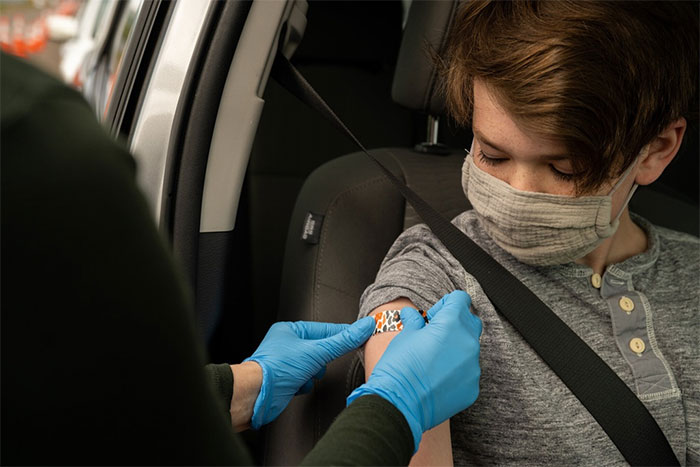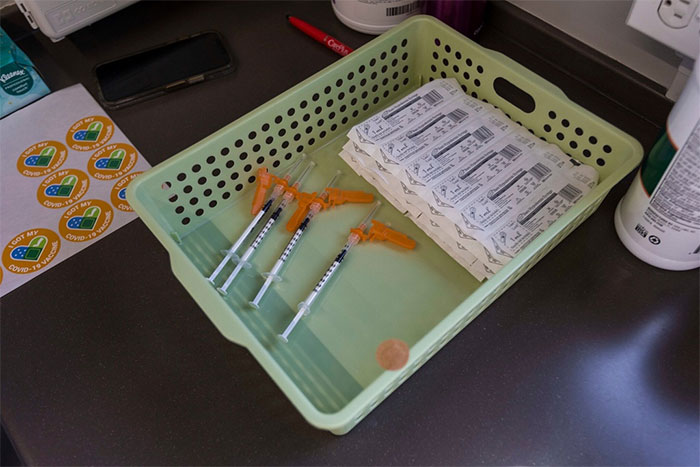American scientists have recently published results from two studies revealing new findings about immunity to the coronavirus, potentially alleviating concerns about the protective efficacy of Covid-19 vaccines.
Immunity to the coronavirus lasts at least one year, and may even last a lifetime, improving over time, particularly after vaccination, according to two recent studies by American scientists. This finding may help ease worries that protection against the virus only lasts for a short period, as reported by the New York Times on May 26.
The two new studies indicate that the majority of people who have recovered from Covid-19 and then received vaccinations will not need booster shots. However, there are two groups of people who are more likely to need vaccination: those who have been vaccinated but have never been infected with the coronavirus, and a small number of infected individuals whose bodies did not mount a strong immune response.
The first study was published on May 24 in the scientific journal Nature. The results show that coronavirus memory cells (also known as B memory cells) remain in the bone marrow for a long time and will produce antibodies when needed.
The second study, published on BioRxiv, a biology research website, found that B cells continue to mature and become stronger for at least 12 months after the initial infection.

Two new studies may dispel fears that immunity to the coronavirus is only temporary. (Photo: New York Times).
“These results are consistent with the growing number of studies showing that the immune response to SARS-CoV-2, whether from infection or vaccination, is likely to be long-lasting,” said Scott Hensley, an immunologist at the University of Pennsylvania. Hensley was not involved in the two new studies.
Immune Cells Stay in Bone Marrow After Infection or Vaccination
Typically, when encountering a virus for the first time, B cells in the body quickly proliferate and produce large amounts of antibodies to fight it off. After the acute infection is resolved, some B cells remain in the bone marrow and continue to produce a steady amount of antibodies.
To observe the B cells specific to the coronavirus, a research team led by Dr. Ali Ellebedy from Washington University in St. Louis analyzed blood samples from 77 individuals starting one month after they contracted Covid-19.
The analysis was conducted every three months. Six out of the 77 individuals required hospitalization for treatment, while the others exhibited mild symptoms.
The antibody levels in these individuals dropped rapidly four months after infection and continued to decline gradually over the following months. This finding is consistent with other studies.
Some scientists interpret this as a sign that the body’s immunity wanes over time. However, other experts argue that this is entirely expected. If the body had to maintain high levels of antibodies against every pathogen it has encountered, the blood would become too thick to circulate.
Instead, the levels of antigens in the blood will sharply decline after an acute infection. Meanwhile, memory B cells will lie dormant in the bone marrow, ready to act when needed.

Two new studies show that the memory B cells formed after a Covid-19 infection and further strengthened through vaccination are robust enough to combat virus variants. Individuals like these do not need booster shots. (Photo: New York Times).
Dr. Ellebedy’s team collected bone marrow samples from 19 individuals approximately seven months after they were infected. Among these, 15 had detectable memory B cells, while the remaining four did not. This indicates that some individuals may carry very few or no B cells.
“This tells me that even if you have been infected with the virus, you still might not have a super strong immune response,” said Dr. Ellebedy. This finding reinforces the argument that individuals who have recovered from Covid-19 should still get vaccinated, he noted.
Additionally, five volunteers participating in Dr. Ellebedy’s study donated bone marrow samples 7-8 months after infection and donated once again four months later. From these samples, Dr. Ellebedy and colleagues found that the number of B cells remained stable during that period.
This finding is particularly noteworthy because it is generally very difficult to obtain bone marrow samples, according to Jennifer Gommerman, an immunologist at the University of Toronto. Dr. Gommerman was not involved in Dr. Ellebedy’s research.
Previously, a landmark study in 2007 suggested that antibodies could theoretically last for decades, even exceeding average lifespan. This suggests that B cells persist long-term in the body. Dr. Ellebedy’s new research has provided rare evidence of the persistence of B cells, Dr. Gommerman stated.
Vaccination Still Needed Even After Recovering From Covid-19
In his study, Dr. Michel Nussenzweig from Rockefeller University in New York and colleagues observed the maturation process of memory B cells over time. The researchers analyzed blood from 63 individuals who had recovered from Covid-19 approximately one year prior.
The majority of participants exhibited mild symptoms. Twenty-six individuals had received at least one dose of the Moderna or Pfizer-BioNTech vaccine.
From this, the research team discovered that neutralizing antibodies—antibodies necessary to prevent reinfection—remained unchanged for 6-12 months. Meanwhile, related but less critical antibodies gradually disappeared.
As memory B cells continue to evolve, the antibodies they produce begin to neutralize more variants. This continuous maturation process may stem from the immune system dissecting a fragment of the virus to “practice.”
One year after infection, the neutralizing activity of antibodies in unvaccinated volunteers diminished against all virus variants. The most significant decline was observed in protection against the variant first identified in South Africa.

U.S. Senator Rand Paul stated that he does not need to get the Covid-19 vaccine because he is immune after contracting the virus in March 2020. (Photo: AP).
Vaccination would significantly amplify the levels of antibodies in the body, consistent with other studies. Additionally, vaccination also enhances the neutralizing activity of the body by approximately 50 times.
On May 23, U.S. Senator Rand Paul announced that he would not receive the coronavirus vaccine because he is immune after being infected with the virus since March 2020.
However, there is no guarantee that this immunity is strong enough to protect him for many years, especially as new Covid-19 variants may evade the body’s defenses.
The results of Dr. Nussenzweig’s study also indicate that individuals who have recovered from Covid-19 and subsequently received vaccinations will have very high levels of protection against new variants, even if they do not receive booster shots.
“Individuals who have been infected with Covid-19 and then vaccinated exhibit a truly remarkable response to the same set of antigens, as the antigens in their bodies continue to evolve,” said Dr. Nussenzweig. “I expect these to persist for a very long time.”
“The B cell response here is very good, similar to what we hope to achieve,” commented Marion Pepper, an immunologist at the University of Washington in Seattle, USA. Dr. Pepper is not involved in Dr. Nussenzweig’s new research.
Experts unanimously agree that individuals who have never contracted Covid-19 will have a very different immune response. The body’s battle against a live virus will differ from the response to viral proteins introduced by a vaccine. Furthermore, in individuals who have previously contracted Covid-19, the initial immune response has had time to strengthen over 6-12 months before being challenged by the vaccine.



















































